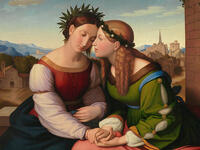
The Yale Voxtet presents a concert of 16th and 17th century music from Germany and Italy, featuring works by Verdelot, Tromboncino, Isaac, Senfl, Hassler, Krieger, Hammerschmidt, Rossi, Caccini, d’India, and Strozzi. The event also features special guests Bettina Pahn and Joachim Held.
The compositions in this concert represent two different worlds. On the one hand, we have the fabulous world of early Renaissance music, in which delightful and sometimes quite cheeky texts are set to polyphonic music. The frottole by Bartolomeo Tromboncino and Marchetto Cara are early Italian madrigals for one or more voices which display great diversity of texture and color. On the other hand, however, we have music, which was written around 1600, in which a big change can be heard. The individual expression, the “affetti,” became more and more important and the meaning of the word was brought to the fore. The “Nuove Musiche” was born. The music is subordinate to the word. Unprecedented dissonances suddenly appear and highlight the meaning of the words. “Prima le parole, doppo la musica,” (The words first, the music after) was the famous saying of Claudio Monteverdi.
Italy provided a lot of inspiration for the development of music. But what was music like in Germany during the Renaissance and early Baroque periods? So called, Tenorlieder, by composers like Ludwig Senfl, Paul Hofheimer, Jobst vom Brandt, and Heinrich Isaac, are part-songs with the melody in the tenor. Tenorlieder are similar to the simpler style of the Italian frottole. They distinguish between a “courtly” and a “popular” style. In the period around 1600, we find composers like, Johann Nauwach, who was strongly influenced by the new developments from Italy, and Heinrich Albert, who was very inspired by Heinrich Schütz, who, in turn, was inspired by the music of Monteverdi and Gabrieli. Tenorlieder, frottole, and monodies were small scale compositions intended for intimate spaces and private settings.
Free and open to the public.
This event will be livestreamed
View a PDF of the concert poster
Members of the Yale Voxtet are students of Professor James Taylor and are candidates for graduate degrees in voice. The select group of eight singers specializes in early music, oratorio, and chamber ensemble. In addition to performing a variety of chamber music programs each year, the group sings, tours, and records as part of Yale Schola Cantorum.